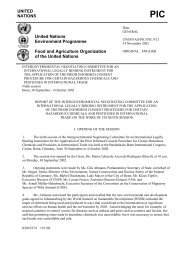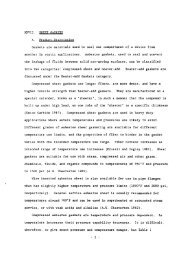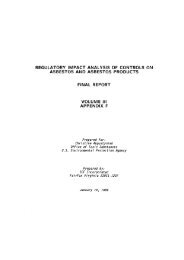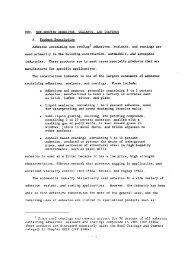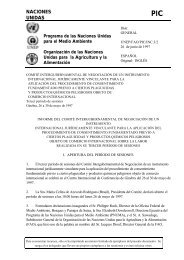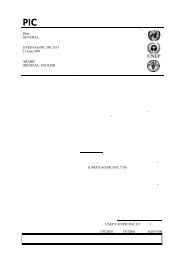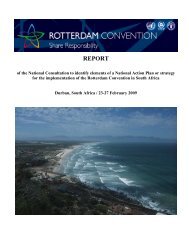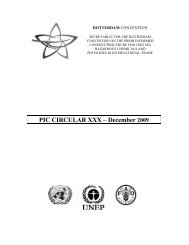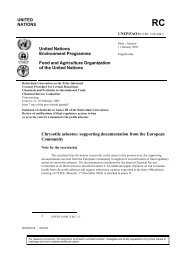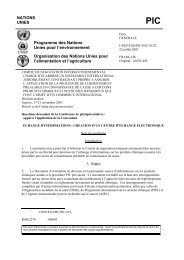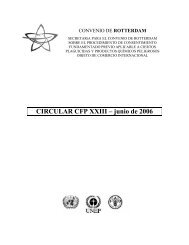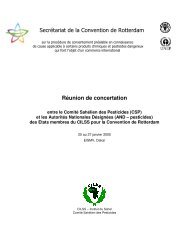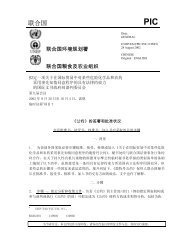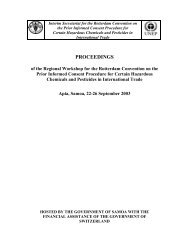Rep o rt of th e tw en - Rotterdam Convention
Rep o rt of th e tw en - Rotterdam Convention
Rep o rt of th e tw en - Rotterdam Convention
You also want an ePaper? Increase the reach of your titles
YUMPU automatically turns print PDFs into web optimized ePapers that Google loves.
The experi<strong>en</strong>ces and successes <strong>of</strong> handling <strong>th</strong>e outbreaks <strong>of</strong> Brontispa longissima (coconut<br />
leaf beetle) provide valuable lessons for multidisciplinary approaches to managing invasive species<br />
whe<strong>th</strong>er in agriculture or forestry. It is increasingly evid<strong>en</strong>t <strong>th</strong>at activities, whe<strong>th</strong>er wi<strong>th</strong> forestry or<br />
agriculture, are intimately connected and have pr<strong>of</strong>ound effects on each o<strong>th</strong>er – whe<strong>th</strong>er wi<strong>th</strong> <strong>th</strong>e<br />
movem<strong>en</strong>t <strong>of</strong> invasive species into an area, or solutions to <strong>th</strong>e problems. This reinforces <strong>th</strong>e view<br />
<strong>th</strong>at such problems cannot be solved wi<strong>th</strong>out <strong>th</strong>e active collaboration <strong>of</strong> bo<strong>th</strong> sectors.<br />
During <strong>th</strong>e workshop, <strong>th</strong>e forestry and agriculture specialists shared wi<strong>th</strong> <strong>th</strong>e att<strong>en</strong>dants <strong>th</strong>eir<br />
experi<strong>en</strong>ces in handling invasive species. The meeting jointly developed an Asia-Pacific strategy<br />
to work in a multidisciplinary manner to address <strong>th</strong>e invasive species managem<strong>en</strong>t.<br />
Coconut Beetle Outbreak in APPPC Member Countries<br />
The Expe<strong>rt</strong> Consultation on Coconut Beetle Outbreak in APPPC Member Countries was held<br />
by <strong>th</strong>e FAO Regional Office for Asia and <strong>th</strong>e Pacific in Bangkok from 26-27 October 2004. It was<br />
att<strong>en</strong>ded by repres<strong>en</strong>tatives from 11 countries including Cambodia, China, Indonesia, Lao People’s<br />
Democratic <strong>Rep</strong>ublic, Malaysia, Maldives, Myanmar, Pakistan, Sri Lanka, Thailand and Viet Nam.<br />
An international consultant from Fiji joined FAO technical <strong>of</strong>ficers to facilitate <strong>th</strong>e expe<strong>rt</strong> consultation.<br />
The objective was to exchange experi<strong>en</strong>ces and lessons learned among <strong>th</strong>e member countries <strong>th</strong>at<br />
were facing <strong>th</strong>e outbreaks.<br />
According to <strong>th</strong>e country repo<strong>rt</strong>s pres<strong>en</strong>ted at <strong>th</strong>e Consultation, <strong>th</strong>ere were coconut beetle<br />
outbreaks in nine countries wi<strong>th</strong> moderate to serious infestation (up to almost 60% <strong>of</strong> <strong>th</strong>e planted<br />
areas attacked). Following recomm<strong>en</strong>dations emerged from <strong>th</strong>e expe<strong>rt</strong> consultation:<br />
Outlook and Recomm<strong>en</strong>dations:<br />
In addressing <strong>th</strong>e pest outbreaks, it is <strong>of</strong>t<strong>en</strong> unsustainable to rely on chemical insecticides.<br />
A better approach is to introduce effective biological control ag<strong>en</strong>ts <strong>th</strong>at attack only <strong>th</strong>e coconut<br />
beetle and do little harm to <strong>th</strong>e <strong>en</strong>vironm<strong>en</strong>t, <strong>th</strong>us restoring <strong>th</strong>e balance <strong>th</strong>at contributes to sustaining<br />
a sound coconut ecosystem.<br />
Brontispa longissima is one <strong>of</strong> <strong>th</strong>e most serious pests <strong>of</strong> coconut in Asia and <strong>th</strong>e Pacific. If<br />
left untreated, <strong>th</strong>e pest could cause costly damages to <strong>th</strong>e coconut industry. In Viet Nam, <strong>th</strong>e damages<br />
could have be<strong>en</strong> in excess <strong>of</strong> one billion US$ over a 30-year period.<br />
Brontispa could be managed successfully in sustainable and <strong>en</strong>vironm<strong>en</strong>t-fri<strong>en</strong>dly way <strong>th</strong>rough<br />
classical biological control.<br />
It is <strong>of</strong> concern <strong>th</strong>at <strong>th</strong>e economies <strong>of</strong> many countries in Asia and Pacific are <strong>th</strong>reat<strong>en</strong>ed due<br />
to <strong>th</strong>e serious outbreak <strong>of</strong> <strong>th</strong>e pest. The invasive species demonstrates <strong>th</strong>e need for str<strong>en</strong>g<strong>th</strong><strong>en</strong>ing<br />
<strong>th</strong>e technical information base, quarantine and IPM capabilities wi<strong>th</strong>in <strong>th</strong>e countries in <strong>th</strong>e region.<br />
The Consultation fu<strong>rt</strong>her recomm<strong>en</strong>ds <strong>th</strong>at individual countries should str<strong>en</strong>g<strong>th</strong><strong>en</strong> <strong>th</strong>eir own<br />
database <strong>of</strong> crop pests and natural <strong>en</strong>emies, conduct indep<strong>en</strong>d<strong>en</strong>t impact assessm<strong>en</strong>ts to facilitate an<br />
<strong>en</strong>abling <strong>en</strong>vironm<strong>en</strong>t for bo<strong>th</strong> biological control and IPM and fu<strong>rt</strong>her str<strong>en</strong>g<strong>th</strong><strong>en</strong> <strong>th</strong>e regulatory<br />
framework <strong>of</strong> plant quarantine, as well as compliance wi<strong>th</strong> <strong>th</strong>e guidelines <strong>of</strong> <strong>th</strong>e ISPM # 2 and # 3,<br />
and pesticide managem<strong>en</strong>t wi<strong>th</strong> concurr<strong>en</strong>t activities for <strong>en</strong>hancing capacity <strong>of</strong> ext<strong>en</strong>sion staff.<br />
O<strong>th</strong>er Activities:<br />
FAO suppo<strong>rt</strong>ed TCP projects in Thailand, Viet Nam, Nauru, and Maldives. The Viet Nam<br />
project showed a return on investm<strong>en</strong>t <strong>of</strong> US$ 3 000 for every dollar? invested by FAO in <strong>th</strong>is<br />
project.<br />
84



